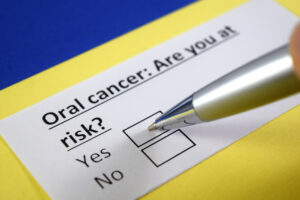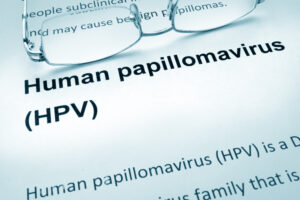Should I be Concerned about Oral Cancer?
 That is a great question! And just the fact that you clicked on this link means you are headed in the right direction. Why? Because everyone should be concerned about oral cancer.
That is a great question! And just the fact that you clicked on this link means you are headed in the right direction. Why? Because everyone should be concerned about oral cancer.
In this week’s blog, we will explain why everyone should be concerned about oral cancer, and which folks should have a little higher level of concern because they have a higher risk.
Why Everyone Should be Concerned about Oral Cancer
While there are specific risk factors associated with oral cancer, it is possible to get oral cancer without having any of them. You may have heard of someone who got lung cancer without ever having touched any form of tobacco? It’s the same with oral cancer. We can make choices to reduce our risk, but we can never be immune to it.
Oral cancer kills roughly one person every hour of every day. Oral cancer is not particularly deadly, and the reason for the high mortality rate is that most people do not detect it until it reaches later stages. As with any type of cancer, early detection increases survival rates.
Early Detection
 Early detection is difficult because in its earliest stages, oral cancer typically does not cause any noticeable symptoms or pain. In fact, in those who are not self-screening and not seeing a dentist on a consistent schedule, it is virtually impossible to find oral cancer lesions in their early stages.
Early detection is difficult because in its earliest stages, oral cancer typically does not cause any noticeable symptoms or pain. In fact, in those who are not self-screening and not seeing a dentist on a consistent schedule, it is virtually impossible to find oral cancer lesions in their early stages.
Early detection of oral cancer increases your survival rate and makes any necessary treatment less aggressive and invasive. There are two essential factors in early detection: 1) self-screening monthly and 2) professional screening yearly.
You can find great instructions for performing your self-screenings at home every month here. Your professional oral cancer screenings occur at your dental evaluation visits, which usually coincide with your professional teeth cleanings. If you are overdue for a professional teeth cleaning, that means that you are probably overdue for your oral cancer screening, too! Call Designer Smiles today to schedule an appointment for both and get back on track!
Some People Should be More Concerned about Oral Cancer
That being said, there are definitely some people with a much higher risk for oral cancer based on various risk factors. Understanding the risks posed by these factors may help you address them in a healthy way and eliminate them, thus reducing your oral cancer risk over your lifetime.
Tobacco Users
Tobacco use is one of the biggest risk factors for oral cancer. While many understand that dipping or chewing tobacco increases one’s oral cancer risk, they may not include smoking in that list of risk factors. Smoking increases the risk for oral cancer in the same way that use of smokeless tobaccos do. According to the Oral Cancer Foundation, more than 75% of people diagnosed with oral cancer over the age of 50 were tobacco users.
This risk factor continues to accumulate and grow over your lifetime, so the earlier you stop using tobacco products, the lower your risk for oral cancer will be.
Heavy Drinkers
Heavy alcohol intake is also a major risk factor for the development of oral cancer. Alcohol alone increases your risk for oral cancer, but when you combine alcohol with tobacco use, the risk increases FIFTEEN TIMES! Those who drink and smoke or use other tobacco regularly are at the highest risk for developing oral cancer.
Limit your alcohol intake in order to lower this risk, and stop all forms of tobacco!
Vaping/E-Cig Usage
We actually need more research on this one, as the usage of e-cigarettes is relatively new. We do not have long-term studies yet, so the evidence is sparse. One report stated: “Here we describe two patients, with positive history for chronic E-cigarette use, that developed oral cancer without any identifiable risk factors other than E-cigarette use.”
Another study concluded: “. . . based on the evidence from the published literature, the e-cigarette can be considered as a potential risk factor for oral cancer due to the presence of carcinogenic components and due to their ability to induce detrimental changes to oral cells, although there is insufficient evidence for causal inference.” That means that we don’t have enough evidence to definitively state that vaping causes oral cancer, but we can call it a risk factor.
HPV Infection
 Most people know that infections with particular strains of the Human Papilloma Virus increases the risk for cervical cancer in women. It is also associated with certain types of oral cancer that occur in the oropharynx (where the mouth meets the throat).
Most people know that infections with particular strains of the Human Papilloma Virus increases the risk for cervical cancer in women. It is also associated with certain types of oral cancer that occur in the oropharynx (where the mouth meets the throat).
Interestingly, these particular types of oral cancer affect younger patients who do not have any of the other risk factors associated with oral cancer. Non-smokers who do not drink alcohol or vape may find themselves at risk for oral cancer due to infection with certain strains of HPV.
Your medical doctor can perform a test to identify any HPV infection and inform you of your specific strains and risks associated with them. In order to limit the risk of HPV infection, you should practice safe sex and limit your number of sexual partners.
More Questions about Oral Cancer?
Call Designer Smiles today to schedule a consultation and oral cancer screening with Dr. Ann. She can answer all of your questions and help you understand and reduce your specific risk factors for oral cancer.
